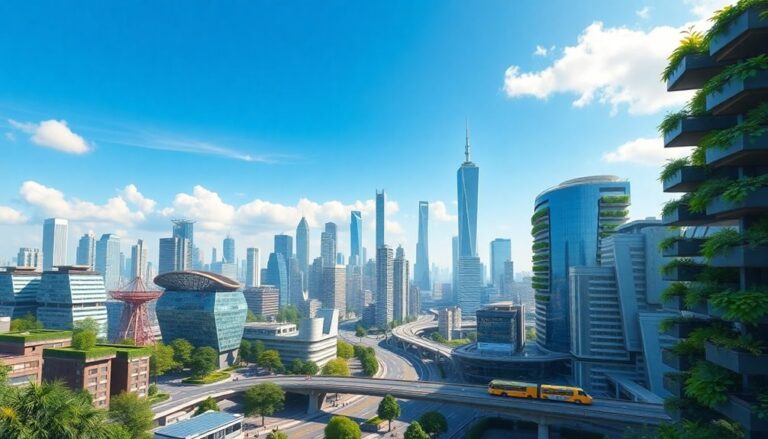In 2025, you'll witness a world filled with challenges. Global conflicts will intensify, particularly in regions like Ukraine and the Middle East. Economically, the threat of recession looms as inflation rises. You'll also face the realities of climate change, with soaring emissions leading to extreme weather and habitat loss. Technological advancements will reshape society, bringing both opportunities and disruptions. Mental health issues may escalate due to rising social isolation and an aging population. As you navigate these shifts, you'll uncover a dynamic landscape that impacts daily life and requires adaptation. Curious about what this all means for you?
Essential Insights
- Climate targets necessitate that global emissions peak by 2025 to avoid severe environmental impacts and limit warming to 1.5°C.
- Ongoing geopolitical tensions, such as the Russia-Ukraine conflict and Israel-Palestine issues, will likely persist, increasing global instability.
- Technological advancements, including agentic AI and quantum computing, are expected to transform industries and societal interactions by 2025.
- Economic forecasts predict U.S. GDP growth at 2.5% in 2025, with recession risks and a global growth rate of 3.2%.
- Mental health challenges will rise due to an aging population and increased social isolation, necessitating better support systems.
Global Conflicts and Wars
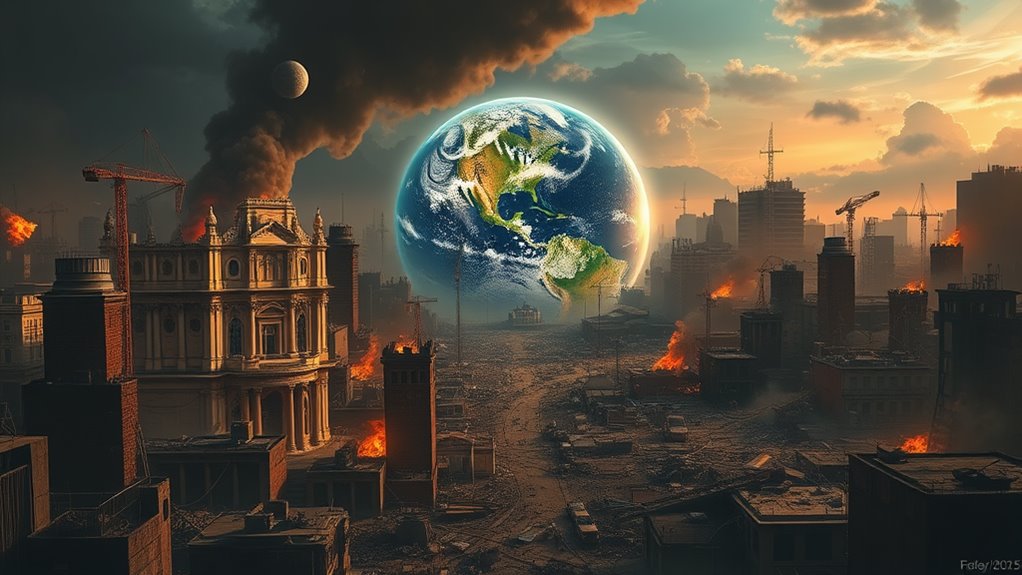
Global conflicts and wars are shaping an increasingly unstable world as geopolitical tensions rise and regional disputes fester. You can see it unfold in the ongoing wars across multiple regions, with the Russia-Ukraine conflict continuing to show no signs of resolution.
The Israel-Palestine conflict intensifies, fueling chaos in the Middle East while deepening schisms in the Balkans and further destabilizing the Sahel region. These situations not only impact local communities but also have global implications.
As superpowers like the U.S., Russia, China, and Iran engage in escalating rivalries, the threat of proxy wars looms large. You might notice how civil unrest in places like New Caledonia can be manipulated by external powers, turning local grievances into international flashpoints.
The ongoing civil war in Syria has seen a resurgence with new rebel coalitions capturing key territories, further complicating the landscape. In the midst of these conflicts, the Geostrategic Stress Index highlights how state volatility is increasing the fragility of nations involved, making them more susceptible to foreign intervention.
With geopolitical tensions at a boiling point, the potential for broader conflicts increases. Proxy wars, sustained by foreign aid and intervention, can escalate already volatile situations, leading to larger confrontations.
The Geostrategic Stress Index suggests that many countries will become increasingly susceptible to destabilization over the next five to ten years. As natural disasters and economic disputes add to the mix, the risk of global conflict becomes more tangible.
In this climate, you can't ignore the pressing need for diplomatic resolutions to avert a catastrophic outcome.
Economic Crisis Predictions

As geopolitical tensions escalate, the economic landscape looks increasingly precarious. You're likely to feel the effects of this instability as financial markets react to heightened uncertainty.
While the U.S. GDP is forecasted to grow at 2.5% in 2025, this positive outlook is overshadowed by looming recession risks. A 15% chance of recession within the next year may have you questioning the stability of your investments and job security. Moreover, there is an anticipated increase in risk-taking as lower taxes and lighter regulations come into play, which could further complicate the economic environment.
Global growth is projected at 3.2%, but advanced economies will face unique challenges. For instance, the Eurozone is expected to grow only 1.2%, with Germany struggling while Spain shows improvement.
Meanwhile, China's growth is slowing due to trade tariffs and domestic issues. Such disparities can create turbulence in international markets, amplifying financial instability.
Inflation remains a key concern, as PCE inflation in the U.S. could hit 2.2%, potentially rising further due to productivity gains. Interest rates, including the federal funds rate at 3.5%, could also shift as central banks maneuver through these economic pressures.
These factors mean that you should stay vigilant and consider diversifying your financial portfolio.
In short, while some indicators suggest growth, the risks of recession and financial instability are real. Steering through this uncertain terrain will require careful planning and a keen eye on global events as you prepare for 2025.
Climate Change Effects
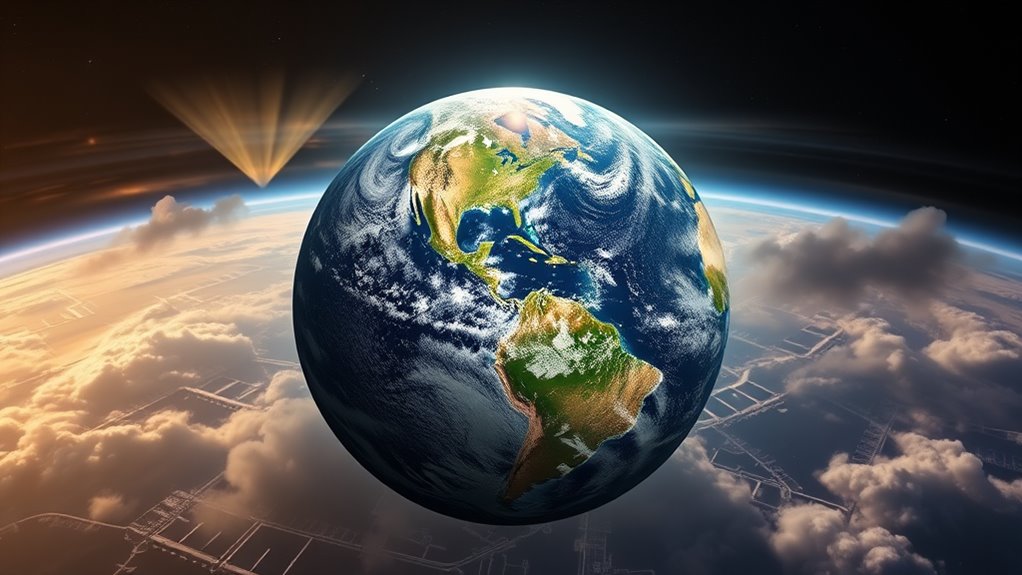
Facing an urgent climate crisis, humanity must recognize that emissions need to peak by 2025 to stave off catastrophic changes to our planet. The impacts of climate change are already evident, with glaciers shrinking and ecosystems shifting. If we don't act now, the consequences will only worsen, leading to irreversible changes for centuries. ABC News provides real-time coverage of climate-related events, helping to keep the public informed about the urgency of this crisis.
To combat this, you can focus on carbon footprint reduction in your daily life and advocate for policies that promote ecosystem resilience. Here's a snapshot of current climate change effects:
| Climate Change Effects | Projected Outcomes |
|---|---|
| Glaciers and ice sheets shrinking | Increased sea level rise |
| Shifting geographic ranges of species | Loss of biodiversity |
| Earlier blooming of plants | Disruption of natural cycles |
| More frequent extreme weather | Higher economic and health costs |
By 2030, we need to halve emissions to limit warming to 1.5°C, as set by the Paris Agreement. This requires a steep reduction in fossil fuel use and a shift to renewable energy sources. Ignoring these steps could see our planet's temperature rise considerably, leading to devastating impacts like extreme heatwaves, droughts, and intensified storms.
Your role is vital. By advocating for change in your community and supporting sustainable practices, you can contribute to building a resilient future. Remember, every action counts in the fight against climate change.
Natural Disasters Forecast
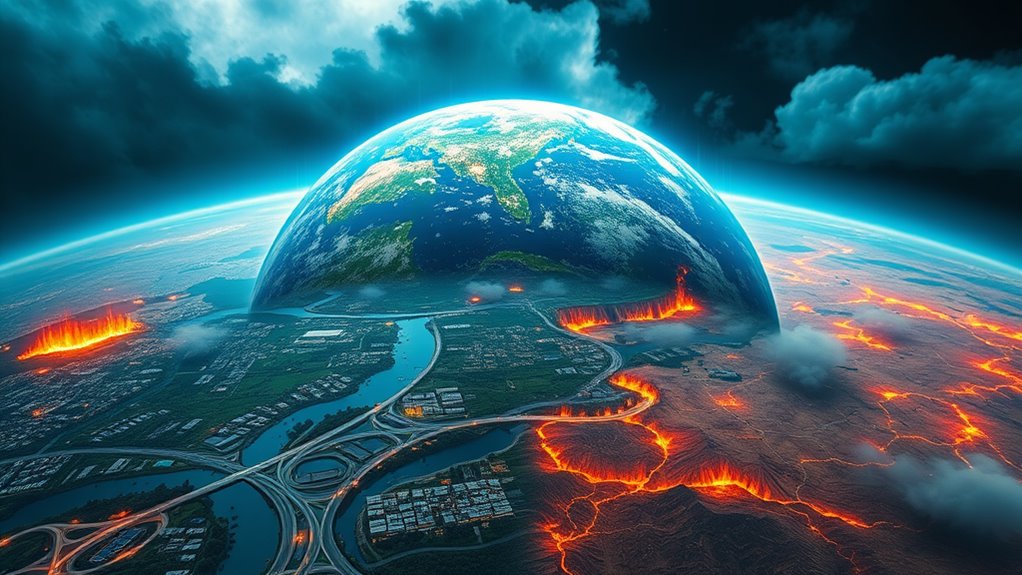
The urgency of climate change isn't just about rising temperatures; it's also linked to increased natural disasters. As experts predict, 2024 and 2025 are expected to be high-risk years for earthquakes, with the likelihood of events registering magnitudes of 6.4 or greater. You face a staggering 90% risk of experiencing a quake between 6.4 and 8.0 in 2024, alongside a 40% chance for those reaching magnitudes of 7.5 or higher. Furthermore, the potential collapse of the Atlantic Meridional Overturning Circulation could disrupt weather patterns, exacerbating the frequency of extreme events like earthquakes.
Regions like California are particularly vulnerable, with historical data showing a 90% correlation between the Global Weather Oscillations (GWO) model and major quakes since 1899. This means it's essential for you to be proactive about earthquake preparedness. Understanding that the most likely period for seismic activity is between December and February can help you plan ahead.
Moreover, the trends indicate a moderate to high risk for strong earthquakes in the coming years, which emphasizes the significance of effective disaster response strategies. Communities need to be equipped with plans and resources to deal with potential disasters. Improved data tracking and reporting can aid in understanding and mitigating risks but ultimately, personal and community preparedness plays a critical role.
As we approach these high-risk years, staying informed and ready is key. You should consider participating in local preparedness drills, learning about emergency kits, and understanding evacuation routes to guarantee you and your loved ones stay safe.
Technological and Societal Changes
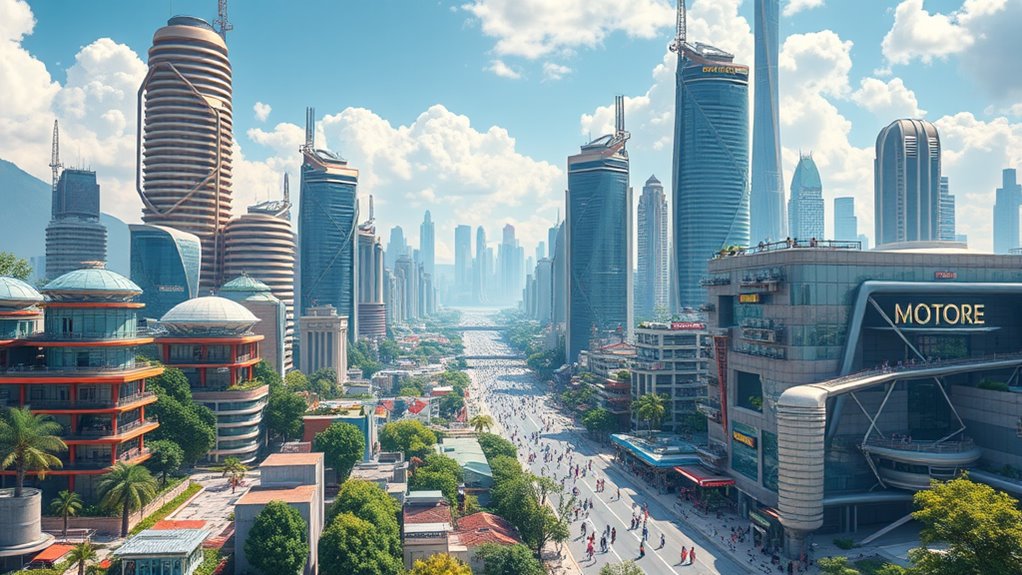
Transformations in technology and society are set to redefine life on Earth by 2025. You'll see the rise of agentic AI, enhancing autonomous decision-making in a variety of fields. Quantum computing will revolutionize data processing, improving energy efficiency and security, while hybrid computing combines different architectures to boost performance.
As energy-efficient computing becomes the norm, innovative technologies like GPUs and neuromorphic computing will help minimize carbon footprints. Spatial computing will change how you interact with digital information, making 3D spaces more intuitive.
With the convergence of human and machine intelligence, you'll experience enhanced productivity and collaboration, aided by multifunctional robots that perform an array of tasks. Meanwhile, AI governance platforms will emerge to manage ethical considerations and risks associated with these advancements. Additionally, the importance of data quality will be emphasized, as organizations strive to integrate reliable data into their AI models.
Concerns about global cybersecurity will prompt the development of quantum security measures to protect against potential threats from advanced computing technologies. As the global population ages and trust in institutions dwindles, you may encounter rising mental health challenges due to increased social isolation, shifting demographics, and declining social connections.
In the workplace, flexibility will become essential for talent acquisition and retention, with companies prioritizing employee well-being through personalized benefits. As customer-centricity evolves, businesses will adapt to the needs of both aging and younger populations.
Frequently Asked Questions
How Will Individual Countries Respond to Global Conflicts in 2025?
In 2025, you might see countries like India maneuvering conflicts in Southeast Asia by leveraging diplomatic strategies.
For instance, India could strengthen ties with ASEAN nations while forming military alliances to counterbalance China's influence.
As tensions rise, expect nations to react with a mix of economic sanctions and military posturing, often prioritizing national interests over global cooperation.
Your perception of these actions will shape the future of international relations and stability.
What Role Will International Organizations Play During Economic Crises?
International organizations will play an essential role in economic crises by facilitating economic cooperation among nations.
You'll see them coordinating crisis management efforts, providing technical assistance, and mobilizing resources to support vulnerable populations.
They'll promote dialogue to guarantee that countries work together effectively, addressing immediate needs while fostering long-term resilience.
How Can Communities Prepare for Extreme Weather Events?
To prepare for extreme weather events, you should focus on community resilience and emergency preparedness.
Start by developing clear evacuation plans and practicing drills to guarantee everyone knows their roles. Invest in infrastructure improvements like storm shutters and regular maintenance checks.
Keep emergency supplies ready, including food and medical kits, and utilize technology for real-time updates.
Engage your community through training sessions, making sure everyone is informed and ready to respond when disaster strikes.
What Personal Actions Can Individuals Take to Address Climate Change?
Every little action counts, like raindrops forming a river.
To tackle climate change, you can shrink your carbon footprint by adopting sustainable practices. Eat more plant-based meals, bike instead of driving, and turn off appliances when not in use.
Support local businesses and buy seasonal foods to cut emissions. You can also spread awareness and encourage friends to join you in making these impactful choices for a healthier planet.
What Ethical Dilemmas May Arise From Technological Advancements?
As you navigate the landscape of technological advancements, you'll encounter ethical dilemmas like AI ethics and privacy concerns.
You might face automation's impact on jobs and the widening digital divide.
Surveillance technology raises questions about personal freedoms, while bioengineering dilemmas challenge your understanding of human intervention in nature.
It's essential to critically assess these issues, ensuring that technology serves everyone fairly, without exacerbating existing inequalities or compromising privacy.
